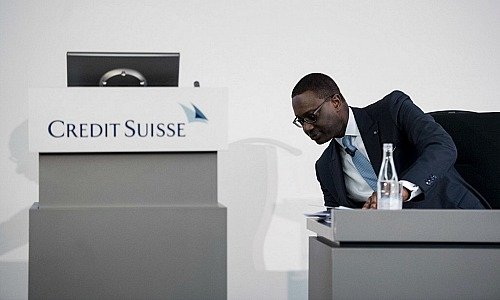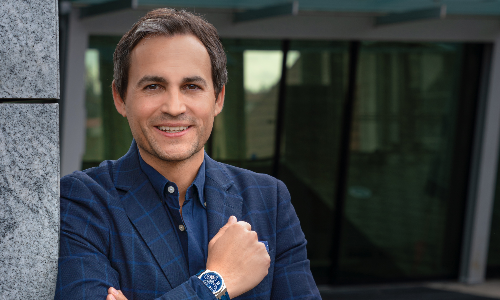It’s been nearly a year since the French-Ivory Coast executive took the helm at Credit Suisse. With the bank in a sorry state of affairs, it seems Thiam still hasn’t truly settled down in the job. Why not?
Just like Credit Suisse’s press releases, this item is prefixed with a disclaimer: Tidjane Thiam and Chairman Urs Rohner have explained numerous times that the success of the bank’s new strategy unveiled last October can only be judged after two or three years, not from one quarter to the next.
Nevertheless, observers following the Swiss bank’s development closely cannot deny that Credit Suisse is in a lamentable state 12 months after Thiam took over. Here are his seven main stumbling points:
1. Little Sensitivity Shown In Salary Matters
As in much of the world, banker pay is a touchy subject in Switzerland. Thiam showed little tact here: he was paid 4.6 million francs for six months of work last year. He did voluntarily forgo 40 percent of his bonus, but the gesture rang hollow. Thiam was also awarded shares worth 14.6 million francs for leaving Prudential.
Thiam maneuvered himself into this spot, signalling that he sees himself as part of a caste of executives who define themselves in part by the size of their salary. Showing a modicum of modesty instead would have lent him an enormous amount of much-needed support and credibility internally.
2. Strategy by Management Consultant
Thiam sold his credentials largely on the transformation of Prudential, and investors are expecting him to do the same at Credit Suisse. However, his strategy at the bank isn’t truly a transformative one and in particular is missing his own personal ideas or innovative approaches. Reducing the investment bank and focusing on Asia isn’t especially revolutionary.
But the largest drawback of October’s strategy announcement, since revised, is that it was written by management consultants – a guild Thiam used to belong to – and not by bankers. And by spinning off its Swiss universal bank, Credit Suisse is set to hollow out its soul (see point 3).
3. IPO is Necessary, But Raises Questions
Credit Suisse presented the listing of its Swiss bank as a strategic step, but it has become clear that the move is little more than a deferred cap hike. Credit Suisse desperately needs the funds it will take in by placing 20 to 30 percent of the unit with outside investors in order to bolster its capital, especially given worsening financial markets hitting revenue this year as well as a hefty investment banking writedown for illiquid products.
At the same time in creating a curious structure, Thiam is posing more questions – about capital allocation, duplication, arbitrage of the two stocks – than the strategy can answer. The remaining, considerably smaller Credit Suisse could also tempt trade buyers.
4. Trust Quickly Squandered
It’s not just a cliche: trust in top management is a bank’s most important currency. At Credit Suisse, that trust has been eroding as rapidly as the share price has been dropping. A larger-than-average number of employees are dissatisfied, and even some institutional investors want Thiam gone.
A spate of high-level departures like John Haefelfinger, Holger Spielberg, David Denunzio orRobert «Bob» Jain underscores how precarious the situation really is. Thiam has failed to attract new top bankers beyond Andreas Arni for Credit Suisse's enterpreneur bank, a team of private bankers focused on Mexico, and several investment bankers.
5. Open Feud With Investment Bank
«Don’t fight the Fed» is an old mantra of stock market veterans, meaning investors should never bet against monetary policy because central banks will always prove more powerful than private institutions. The same holds true for investment bankers: CEOs are well-advised not to agitate this powerful faction of bankers, even when slashing costs, as Thiam is doing. This is especially true because investment banking makes up such a large part of Credit Suisse's DNA.
But through a lack of diplomacy and sharp public rebukes, Thiam has done exactly this. Now, he faces an increasingly public campaign being waged against him through the pages of powerful American papers like «The Wall Street Journal» and the «New York Times».
6. Stuck in Ivory Tower
Thiam enjoyed an enormous amount of sympathy when he was named head of Credit Suisse, even before Switzerland knew who he was. The fact that this sympathy soured so quickly has nothing to do with rumors – denied by Credit Suisse – of his insisting on presidential suites and commuting by private jet.
Instead, it can be traced directly back to a small group of powerful acolytes who have followed Thiam to Credit Suisse – several from consulting firm McKinsey – and seem to do everything they can to shield him from key Credit Suisse contacts. This in turn prevents many necessary measures from trickling down effectively and having the desired effect in the bank.
7. (Too) Big Asia Bet
Credit Suisse is pinning its hopes on Thiam’s expertise in Asia, a region he cultivated for his prior employer, Prudential. Whether that expertise is enough to master the bank’s Asian business is unclear. Credit Suisse’s Asian operations have a life of their own and Thiam has, in his efforts as head of Credit Suisse, not been overly perceptible despite several vists.
Growth prospects in this hotly-contested market have also slowed in the last six months, which threatens to undermine Thiam’s revenue expectations in this market.


























